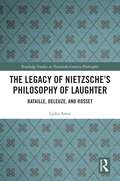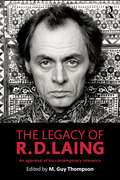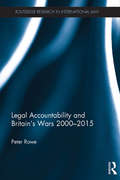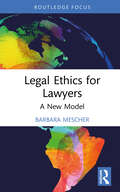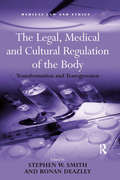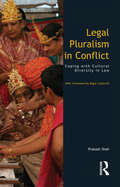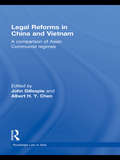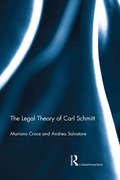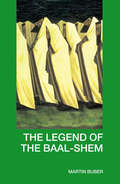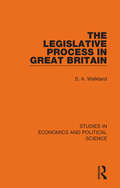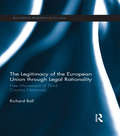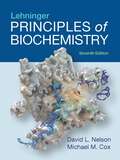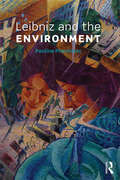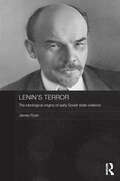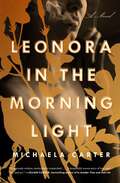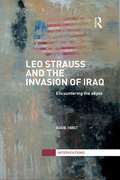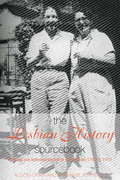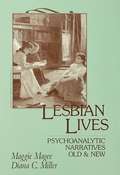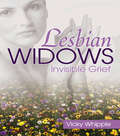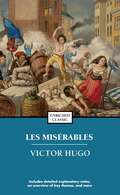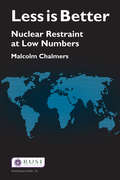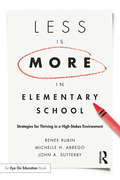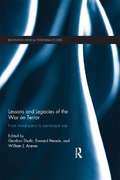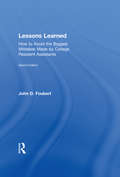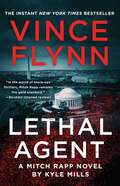Special Collections
Benetech’s Global Certified Accessible Titles
Description: Benetech’s GCA program is the first independent third-party EPUB certification to verify ebook accessibility. By creating content that is born accessible, publishers can meet the needs of all readers. Learn more: https://bornaccessible.benetech.org/
- Table View
- List View
The Legacy of Nietzsche’s Philosophy of Laughter
by Lydia AmirThis book investigates the role of humor in the good life, specifically as discussed by three prominent French intellectuals who were influenced by Nietzsche's thought: Georges Bataille, Gilles Deleuze, and Clément Rosset. Lydia Amir begins by discussing Nietzsche’s reception in France, and she explains why and how he came to be considered a "philosopher of laughter" in the French academe. Each of the subsequent three chapters focuses on the significance of humor and laughter in the good life as advocated by Bataille, Deleuze, and Rosset. These chapters also explore the complex relationship between the comic and the tragic, and of humor and laughter to irony, satire, and ridicule. The Legacy of Nietzsche’s Philosophy of Laughter makes an invaluable contribution to recent interpretive work done on Bataille and Deleuze, and offers further introduction to the relatively understudied Rosset. It illuminates the philosophies of these three thinkers, their connection to Nietzsche, and, overall, the significant role that humor plays in philosophy.
The Legacy of R. D. Laing
by M. Guy ThompsonThe name R. D. Laing continues to be widely recognized by those in the psychotherapy community in the United States and Europe. Laing’s books are a testament to his breadth of interests, including the understanding of madness, alternatives to conventional psychiatric treatment, existential philosophy and therapy, family systems, cybernetics, mysticism, and poetry. He is most remembered for his devastating critique of psychiatric practices, his controversial rejection of the concept of ‘mental illness,’ and his groundbreaking center for people in acute mental distress at Kingsley Hall, London. Most of the books that have been published about Laing have been written by people who did not know him personally and were unfamiliar with Laing the man and teacher. The Legacy of R. D. Laing: An appraisal of his contemporary relevance is composed by thinkers and practitioners who knew Laing intimately, some of whom worked with Laing. This collection of papers brings a perspective and balance to Laing’s controversial ideas, some of which were never addressed in his books. There has never been a collection of papers that address so thoroughly the question of who Laing was and why he became the most famous psychiatrist in the world. As M. Guy Thompson’s collection illustrates, there are now a number of alternatives to psychiatry throughout the world, and much of this can be credited to Laing’s influence. The Legacy of R. D. Laing will ensure the reader has a keen grasp of who Laing was, what it was like to be his patient or his friend, and why his thinking was far ahead of its time, even in the radical era of the 1970s. It is timely to appraise the nature of his contribution and bring Laing back into contemporary conversations about the nature of sanity and madness, and more humane approaches to helping those in profound mental distress. This book offers an in-depth insight into the work of R.D. Laing. It will be a must read for psychoanalysts, psychotherapists, family therapists, psychiatrists and academics alike. M. Guy Thompson, PhD is a Personal and Supervising Analyst at the Psychoanalytic Institute of Northern California and Chairman of Free Association, Inc., a non-profit organization devoted to the dissemination of Laing’s ideas, in San Francisco. Dr. Thompson received his psychoanalytic training from R. D. Laing and associates at the Philadelphia Association and is the author of numerous books and journal articles on psychoanalysis, phenomenology, and schizophrenia. He currently lives in San Rafael, California.
Legal Accountability and Britain's Wars 2000-2015
by Peter RoweThis book discusses the manner in which Britain’s wars, which took place between 2000 and 2015, have interacted with the relevant principles of international law and English law for the purpose, primarily, of considering legal accountability. During a debate in the House of Lords in 2005 a former Chief of the Defence Staff commented that ‘the Armed Forces are under legal siege.’ The book will discuss the major legal issues which have arisen, ranging from the various votes in Parliament to go to war, the constitutional relationship between ministers and senior commanders, the right under international law to use force, the influence of human rights law, the role of the courts in England (including the coroners’ courts), to the legal regime applying to the conduct of UK military operations. It will assess critically whether the armed forces will now have to accept that operations conducted outside the UK are subject to greater legal scrutiny than previously and whether, if this is the case, it is likely to hinder their future military activities. This book will be of great interest to scholars of international law, the law of armed conflict, military studies and international relations, as well as to those with a professional or other interest in the subject matter.
Legal Ethics for Lawyers
by Barbara MescherThis book proposes a new model of professional ethics enabling lawyers to advise clients upon both the law and ethics. This will better protect clients, and society, and enhance lawyers’ professional obligations. The current model of legal ethics, developed in the 19th century, specified that the role of lawyers was only to interpret the law, not also to give ethical advice. This was acceptable to lawyers, clients, and society at that time. However, this is not the case now and legal ethics no longer reflects the needs of modern legal practice. This book draws on moral philosophy to present a new model of legal ethics that explains the analytical process to include ethical advice. It analyses the potential harm of the present model to the legal profession who have duties to the law and justice that may compete with demands by clients to serve them. Further, lawyers’ duty to clients to act in their best interests is sometimes not adequately fulfilled as legal ethics does not permit lawyers to give ethical advice even if it may be in clients’ best interests to do so. The work includes a detailed case study of corporate law practice to show why a new legal ethics is required. Other case examples are provided to demonstrate that lawyers practicing in all areas of law encounter ethical issues and they too will benefit from a new legal ethics. The book will be essential reading for students, academics, lawyers and professional bodies.
The Legal, Medical and Cultural Regulation of the Body
by Stephen W. SmithThe regulation of the body provides an important concern in law, medical practice and culture. This volume contributes to existing research in the area by encouraging experts from a range of related disciplines to consider the legal, cultural and medical ways in which we regulate the body, further exploring how conceptions of self, liberalism, property and harm inform and influence contentious legal and ethical questions about what we can and cannot do to or with our own bodies.
Legal Pluralism in Conflict
by Prakash ShahLegal Pluralism in Conflict offers a new theoretical perspective for conceptualising and analysing the relationship between ethnic minority laws and the official legal order. Examining the limits of liberal legal thought in light of a contemporary plurality of ethnic identifications and religious beliefs, Prakash Shah takes up the case for a 'legal pluralism' that views ethnic minority laws in interaction with the official British legal order. This form of legal pluralism is not, however, without conflict. This book pursues a series of case studies that critically consider why and how state laws marginalise ethnic minority legal orders. Legal Pluralism in Conflict contains discussions of the recognition of polygamous marriages, homicide, the expertise provided in immigration cases and the legal discourse of nationality. It is in this engagement with some of the most challenging issues posed by the diverse character of modern society that its author sets out an alternative course for ethnic minority legal studies. Legal Pluralism in Conflict will be invaluable to students and researchers concerned with law's relationship to and treatment of ethnic and religious diversity, as well as to those with wider interests in the limits and possibilities of political pluralism.
Legal Reforms in China and Vietnam
by John Gillespie and Albert H.Y. ChenAlthough the adoption of market reforms has been a key factor leading to China’s recent economic growth, China continues to be governed by a communist party and has a socialist-influenced legal system. Vietnam, starting later, also with a socialist-influenced legal system, has followed a similar reform path, and other countries too are now looking towards China and Vietnam as models for development. This book provides a comprehensive, comparative assessment of legal developments in China and Vietnam, examining similarities and differences, and raising important questions such as: Is there a distinctive Chinese model, and/or a more general East Asian Model? If so, can it be flexibly applied to social and economic conditions in different countries? If it cannot be applied to a culturally and politically similar country like Vietnam, is the model transportable elsewhere in the world? Combining ‘micro’ or interpretive methods with ‘macro’ or structural traditions, the book provides a nuanced account of legal reforms in China and Vietnam, highlighting the factors likely to promote, change or resist the spread of the Chinese model.
The Legal Theory of Carl Schmitt
by Mariano Croce and Andrea SalvatoreThe Legal Theory of Carl Schmitt provides a detailed analysis of Schmitt’s institutional theory of law, mainly developed in the books published between the end of the 1920s and the beginning of the 1930s. By reading Schmitt’s overall work through the lens of his institutional turn, the authors offer a strikingly different interpretation of Schmitt’s theory of politics, law and the relation between these two domains. The book argues that Schmitt’s adhesion to legal institutionalism was a key theoretical achievement, based on serious reconsideration of the main flaws of his own decisionist paradigm, in the light of the French and Italian institutional theories of law. In so doing, the authors elucidate how Schmitt was able to unravel many of the impasses that affected his previous conceptual framework. The authors also make comparisons between Schmitt and other leading legal theorists (H. Kelsen, M. Hauriou, S. Romano and C. Mortati) and explain why the current legal debate should take into serious account his legacy.
The Legend of the Baal-Shem
by Martin BuberThese twenty captivating stories about the founder of the Hasidic faith Israel ben Eliezer called the Baal-Shem or Master of God's Name, provide a profound and charming account of the genesis of Hasidism, still Judaism's most important religious movement. As a delicate and moving portrayal not only of the power of the Baal-Shem's mystical faith, but also of Eastern European Jewish daily life, The Legend of the Baal-Shem is an ideal introduction to Hasidic religious thought, and to Martin Buber's own influential philosophy of love and mutual human understanding.
The Legislative Process in Great Britain
by S. A. WalklandOriginally published in 1968, this book deals with the process of public legislation in modern Britain at the time, not in terms of constitutional formulae, but by a realistic appraisal of the relationships between the political institutions and forces which gave the process its shape. It concentrates particularly on the procedures and conventions which operated at the preparatory stages of legislation, and established that legislation was almost exclusively a governmental function, Parliament playing only a minor role. It is particularly concerned to stress the extent to which consultation by the government with pressure groups was now a major feature of the legislative process, and concludes that subordinate departmental legislation, developed as a result of collaboration between pressure groups and Civil Servants, was the most characteristic and important stage of the legislative process in Britain. The book brought together the conclusions of recent scholarship in this field, and the result is a balanced perspective of an important decision-making process of British government at the time. Today it can be read in its historical context.
The Legitimacy of The European Union through Legal Rationality
by Richard BallThird country nationals (TCNs) play an important part in the economy of the European Union, reflected in the rights granted to them under European Union Law. Political expediency is however shaped by world, regional and domestic influences that in turn determine policy towards third country nationals and their legal rights to freedom of movement. This book examines the concept of political legitimacy within the European Union through the principles of legal rationality, focusing in particular on the European Union’s policy towards third country nationals. Richard Ball argues that for legal doctrine to be rational it must display the requirements of formal, instrumental and substantive rationality, each mutually exclusive and essential. In taking this position of legal rationality, the book focuses on free movement rights of TCNs within EU treaties and implementing legislation, the Area of Freedom Security and Justice, and Association Agreements. Ball concludes that the stance of European Union Law towards third country nationals lacks legitimacy, and suggests possible new directions that EU policy should take in the future.
Lehninger Principles of Biochemistry
by David L. Nelson and Michael M. CoxLehninger Principles of Biochemistry is #1 bestseller for the introductory biochemistry course because it brings clarity and coherence to an often unwieldy discipline, offering a thoroughly updated survey of biochemistry's enduring principles, definitive discoveries, and groundbreaking new advances with each edition. This new Seventh Edition maintains the qualities that have distinguished the text since Albert Lehninger's original edition--clear writing, careful explanations of difficult concepts, helpful problem-solving support, and insightful communication of contemporary biochemistry's core ideas, new techniques, and pivotal discoveries. Again, David Nelson and Michael Cox introduce students to an extraordinary amount of exciting new findings without an overwhelming amount of extra discussion or detail.
Leibniz and the Environment
by Pauline PhemisterThe work of seventeenth-century polymath Gottfried Wilhelm Leibniz has proved inspirational to philosophers and scientists alike. In this thought-provoking book, Pauline Phemister explores the ecological potential of Leibniz’s dynamic, pluralist, panpsychist, metaphysical system. She argues that Leibniz’s philosophy has a renewed relevance in the twenty-first century, particularly in relation to the environmental change and crises that threaten human and non-human life on earth. Drawing on Leibniz’s theory of soul-like, interconnected metaphysical entities he termed 'monads', Phemister explains how an individual’s true good is inextricably linked to the good of all. Phemister also finds in Leibniz’s works the rudiments of a theory of empathy and strategies for strengthening human feelings of compassion towards all living things. Leibniz and the Environment is essential reading for historians of philosophy and environmental philosophers, and will also be of interest to anyone seeking a metaphysical perspective from which to pursue environmental action and policy.
Lenin's Terror
by James RyanThis book explores the development of Lenin’s thinking on violence throughout his career, from the last years of the Tsarist regime in Russia through to the 1920s and the New Economic Policy, and provides an important assessment of the significance of ideological factors for understanding Soviet state violence as directed by the Bolshevik leadership during its first years in power. It highlights the impact of the First World War, in particular its place in Bolshevik discourse as a source of legitimating Soviet state violence after 1917, and explains the evolution of Bolshevik dictatorship over the half decade during which Lenin led the revolutionary state. It examines the militant nature of the Leninist worldview, Lenin’s conception of the revolutionary state, the evolution of his understanding of "dictatorship of the proletariat", and his version of "just war". The book argues that ideology can be considered primarily important for understanding the violent and dictatorial nature of the early Soviet state, at least when focused on the party elite, but it is also clear that ideology cannot be understood in a contextual vacuum. The oppressive nature of Tsarist rule, the bloodiness of the First World War, and the vulnerability of the early Soviet state as it struggled to survive against foreign and domestic opponents were of crucial significance. The book sets Lenin’s thinking on violence within the wider context of a violent world.
Leonora in the Morning Light
by Michaela Carter*One of Oprah Daily&’s Most Anticipated Historical Fiction Novels That Will Sweep You Away* &“Michaela Carter&’s training as a poet and painter shines through from the first page of this vivid, gorgeous novel based on the lives of Leonora Carrington and Max Ernst. Told with all the wild magic and mystery of the Surrealists themselves, Leonora in the Morning Light fearlessly illuminates the life and work of a formidable female artist.&” —Whitney Scharer, bestselling author of The Age of Light For fans of Amy Bloom&’s White Houses and Colm Tóibín&’s The Master, a &“gorgeously written, meticulously researched&” (Jillian Cantor, bestselling author of Half Life) novel about Surrealist artist Leonora Carrington and the art, drama, and romance that defined her coming-of-age during World War II.1940. A train carrying exiled German prisoners from a labor camp arrives in southern France. Within moments, word spreads that Nazi capture is imminent, and the men flee for the woods, desperate to disappear across the Spanish border. One stays behind, determined to ride the train until he reaches home, to find a woman he refers to simply as &“her.&” 1937. Leonora Carrington is a twenty-year-old British socialite and painter when she meets Max Ernst, an older, married artist whose work has captivated Europe. She follows him to Paris, into the vibrant world of studios and cafes where rising visionaries of the Surrealist movement like Andre Breton, Pablo Picasso, Lee Miller, Man Ray, and Salvador Dali are challenging conventional approaches to art and life. Inspired by their freedom, Leonora begins to experiment with her own work, translating vivid stories of her youth onto canvas and gaining recognition under her own name. It is a bright and glorious age of enlightenment—until war looms over Europe and headlines emerge denouncing Max and his circle as &“degenerates,&” leading to his arrest and imprisonment. Left along as occupation spreads throughout the countryside, Leonora battles terrifying circumstances to survive, reawakening past demons that threaten to consume her. As Leonora and Max embark on remarkable journeys together and apart, the full story of their tumultuous and passionate love affair unfolds, spanning time and borders as they seek to reunite and reclaim their creative power in a world shattered by war. When their paths cross with Peggy Guggenheim, an art collector and socialite working to help artists escape to America, nothing will be the same. Based on true events and historical figures, Leonora in the Morning Light is &“a deeply involving historical tale of tragic lost love, determined survival, the sanctuary of art, and the evolution of a muse into an artist of powerfully provocative feminist expression&” (Booklist, starred review).
Leo Strauss and the Invasion of Iraq
by Aggie HirstThe political philosophy of Leo Strauss has been the subject of significant scholarly and media attention in recent years, particularly in the context of the decision to invade Iraq in 2003. Allegations that a group of Strauss-inspired Neo-conservatives intervened in the foreign policy establishment of the US in order to realise the policy of 'regime change' began to emerge soon after the invasion, and unanswered questions remain a decade later. This book addresses these claims, focusing specifically on a group of Straussians active in the spheres of intelligence production, think tanks, and the media during the period from the 9/11 attacks to the invasion in 2003. Such an examination is intended not simply to identify and expose their activities promoting the policy of 'regime change' in Iraq during this period, but also to challenge them and the Straussian logics underpinning them. Utilising the thought of Jacques Derrida, the book enacts a deconstructive challenge to Strauss’ political philosophy which unsettles the fundamental assumptions it relies upon. In doing so, it exposes the securitising imperative underpinning Straussian thought and the Straussian interventions. It thereby simultaneously addresses crucial issues in political theory and contemporary foreign policy studies, while asserting that these dimensions of international politics can and should be dealt with in conjunction with each other. This book would be of interest to students and scholars of Global Politics, Political Theory, Security Studies and US Foreign Policy, and those outside the academy interested in Neo-conservatism and the 2003 invasion of Iraq.
The Lesbian History Sourcebook
by Alison Oram and Annmarie TurnbullThis groundbreaking critical anthology gathers together a wide range of primary source material on lesbian lives in the past. The material here is drawn from a diverse range of sources, including court records, newspaper reports, literary sources, writings on lesbianism from psychologists, doctors, anthropologists, as well as personal letters and journals. The sources are arranged into thematic chapters, covering topics such as archetypes of lesbians - cross-dressing women and romantic friends, the making of lesbianism in culture, professional discourse on lesbians, public perceptions of lesbianism and women's own experiences. This book will be a milestone in the publishing of lesbian history, and is set to provoke the impetus for fresh research.
Lesbian Lives
by Maggie Magee and Diana C. MillerIn this groundbreaking re-visioning of lesbianism, Magee and Miller transcend a literature that, for decades, has focused on the timeworn and misconceived task of formulating a lesbian-specific psychology. Rather, they focus on a set of interrelated issues of far greater salience in our time: the developmental and psychological consequences of identifying as homosexual and of having lesbian relationships. Their consideration of these issues leads to a rigorous review of major psychoanalytic and biological theories about female homosexuality and a probing examination of current notions of gender identity. These tasks set the stage for Magee and Miller's own model of psychologically mature sexuality between members of the same sex. The developmental and clinical issues taken up in specific chapters of Lesbian Lives include the challenges facing lesbian adolescents; the psychological and social significance of "coming out"; the various meanings and contexts of coming out as a gay or lesbian analyst; the interaction of individual psyche and social context in clinical work with lesbian patients; and the history of homosexual therapists and psychoanalytic training. The chapter on "Bryher," the lesbian-identified life partner of the poet Hilda Doolittle (Freud's patient "H.D."), relying on unpublished documents, is not only a wonderful exemplification of themes developed throughout the work, but an invaluable contribution to psychoanalytic history. Lesbian Lives is a heartening sign of the generous scholarship and humane impulse that are transforming psychoanalysis in our time. In writing infused with an experiential immediacy born of personal participation in the stories they tell, Magee and Miller weave a multiplicity of narratives into a fabric of explanation far richer, far more colorful --far truer to lived experience--than anything psychoanalysis has heretofore offered on the subject.
Lesbian Widows
by Victoria WhippleThe unseen issues of grief and discriminationlesbians becoming widows The death of a life partner poses unique challenges for lesbians. Lesbian Widows: Invisible Grief reveals the touching and very personal stories of twenty-five women, including the author, who were widowed at a young age and forced to create a new life without their life partners. The book follows the widows from the time the couple met, to the time when one of the partners died, and beyond, to show how the surviving partner coped with her loss.Many lesbians feel that the intimacy felt between two women in love goes deeper than what can be experienced by heterosexual partners. Lesbian Widows: Invisible Grief reveals themes common to all these women&’s experiences while offering practical advice about coping techniques and resources for support. The widows discuss their efforts to create funerals and memorial services, give their accounts of the overwhelming grief throughout the first two years, and explain the legal and financial discrimination they encountered. The author provides a chapter specifically for caring family and friends, another chapter for professionals working with this sensitive population, and a bibliography of helpful coping resources.Lesbian Widows: Invisible Grief explores the topics of: caregivers/caretaking death and dying grief journeys the similarities and differences between lesbian and married widows the lack of support services for lesbian widows the legal and financial discrimination against lesbian widows the effect of being in or out on grief recovery the issues faced by widows in starting new relationships spirituality gay marriageLesbian Widows: Invisible Grief provides an insightful look into the grieving and recovery process, inspiring hope with the knowledge that others have survived this tragedy. This moving book is an essential resource for lesbians, friends and family of lesbians, mental health professionals, medical professionals, psychiatrists, LGBT health providers, feminist and lesbian organizations, and anyone involved with grief training programs such as hospice.
Les Misérables
by Victor Hugo and Cynthia Brantley Johnson and Margaret BrantleyEnriched Classics offer readers accessible editions of great works of literature enhanced by helpful notes and commentary. Each book includes educational tools alongside the text, enabling students and readers alike to gain a deeper and more developed understanding of the writer and their work.
Les Miserables tells the story of ex-convict, Jean Valjean, and his valiant struggle to redeem his past. A potent social document of the poverty, ignorance, and brutality of man, Les Miserables is also a rousing adventure story, famous for such unrivaled scenes as the brilliant depiction of the Battle of Waterloo. Victor Hugo reached the peak of his powers in this far-reaching novel of nineteenth-century France. Here are combined the dramatic skills of Hugo the playwright, the rich imagination of Hugo the poet, and the compassion of Hugo the man.
Enriched Classics enhance your engagement by introducing and explaining the historical and cultural significance of the work, the author’s personal history, and what impact this book had on subsequent scholarship. Each book includes discussion questions that help clarify and reinforce major themes and reading recommendations for further research. The story of how the convict Jean-Valjean struggles to escape his past and reaffirm his humanity, in a world brutalized by poverty and ignorance, became the gospel of the poor and the oppressed.
Less is Better
by Malcolm ChalmersDespite the rise of ‘new’ security threats like terrorism, cyber-war and piracy, the terrible destructive power of nuclear weapons still hangs over the world. Discussion on further strategic nuclear arms reduction has tended to be dominated by the analysis of possible trade-offs between the US and Russia. But as the prospect of further cuts below ‘New START’ levels is contemplated, increasing attention needs to be paid to the possible shape of a new, multi-power approach to nuclear restraint. While restraint at low numbers goes with the grain of thinking in most nuclear states, correct sequencing will be vital. Using the New START framework, attention could initially be focused on incremental decreases in US and Russian stocks of the most dangerous weapons. Thereafter, the other nuclear powers would need to take steps to limit the size and capabilities of their own arsenals in a process of mutual reductions. If successful, the benefits would be wide ranging: successful restraint amongst existing nuclear-armed states could engender trust, as well as provide mechanisms for reducing the risks of rapid escalation in the event of limited conflict. Less is Better considers the various challenges and opportunities for ensuring restraint at low numbers in today’s complicated web of bilateral nuclear relationships and in the context of the debate on ‘Global Zero’.
Less Is More in Elementary School
by John Sutterby and Renee Rubin and Michelle AbregoIn this era of rigorous standards, testing, and overcrowded curricula, many teachers are left wondering how they’re ever going to cover the material. Less Is More in Elementary School offers realistic solutions by providing ways teachers can streamline their curriculum, get the most out of assessment, communicate with families, and engage students in their own learning. This much-needed book will help you meet the demands of the Common Core more efficiently and effectively. You’ll learn how to… integrate the curriculum so that you can take time to slow down and explore topics in depth; help students become critical readers, problem solvers, collaborators, and communicators; make students more engaged, reflective, and self-regulating; get the most out of assessment during this era of high-stakes testing; maintain high expectations for all students but modify instruction to ensure all students progress; communicate more effectively with families to build trust during a time of change and high-stakes assessments; and overcome obstacles, such as the emphasis on testing, the need for more technology, and finding teacher collaboration time. Each chapter is filled with practical strategies that you can implement immediately, as well as suggested resources for learning more about a particular topic.
Lessons and Legacies of the War On Terror
by Gershon Shafir and Everard Meade and William J. AcevesThis volume examines the lessons and legacies of the U.S.-led "Global War on Terror," utilizing the framework of a political "moral panic." A decade after 9/11, it is increasingly difficult to deny that terror has prevailed – not as a specific enemy, but as a way of life. Transport, trade, and communications are repeatedly threatened and disrupted worldwide. While the pace and intensity of terror attacks have abated, many of the temporary security measures and sacrifices of liberty adopted in their immediate aftermath have become more or less permanent. This book examines the social, cultural, and political drivers of the war on terror through the framework of a "political moral panic": the exploration of threats to particular individuals or institutions that come to be viewed as threats to a way of life, social norms and values, civilization, and even morality itself. Drawing upon a wide range of domestic and international case studies, this volume reinforces the need for reason, empathy, and a dogged defence of principle in the face of terror. This book will be of much interest to students of terrorism studies, human rights, U.S. foreign policy, American politics, and Security Studies and I.R. in general.
Lessons Learned
by John D. FoubertThe college years can be some of the most vibrant and transformative in an individual’s life, but they are also fraught with uncertainty. The resident advisor or assistant (RA) not only confronts these decisions for him or herself but must also help his or her residents navigate the world of important decisions which the undergraduate experience presents. Lessons Learned is the definitive volume for training RAs to become comfortable with their roles as student leaders. Over four dozen common RA mistakes are discussed, chapter-by-chapter, in the form of individual letters written by experienced RAs to new staff members. Each chapter includes thought-provoking discussion questions, a list of internet and media resources, and additional tips related to each situation. Now in its second edition, this updated volume provides a new overview of student developmental theory and covers a host of new topics, including evolving thought on 21st century predicaments such as social media, texting and the Internet. This is an important text for beginning and experienced RAs, as well as for the university staff who train these crucial pillars of the university community.
Lethal Agent
by Kyle Mills and Vince FlynnAn unprecedented and terrifying bioterrorism plot threatens to kill millions in the midst of a divisive presidential election in this &“gut punch of a tale that exploits our greatest fears&” (The Providence Journal) from the #1 New York Times bestselling Mitch Rapp series. A toxic presidential election is underway in an America already badly weakened by internal divisions. While politicians focus entirely on maintaining their own power, ISIS kidnaps a brilliant French microbiologist and forces him to begin manufacturing anthrax. Slickly produced videos chronicling his progress and threatening an imminent attack are posted to the internet, intensifying the hysteria gripping the United States. ISIS recruits a Mexican drug cartel to smuggle the bioweapon across the border, but it&’s really just a diversion. The terrorist organization needs to keep Mitch Rapp and Irene Kennedy distracted long enough to weaponize a deadly virus that they stumbled upon in Yemen. If they succeed, they&’ll trigger a pandemic that could rewrite the world order. Rapp embarks on a mission to infiltrate the Mexican cartels and track down the ISIS leader who he failed to kill during their last confrontation. But with Washington&’s political elite increasingly lined up against him, he knows he&’ll be on his own. Another stellar and white-knuckled thriller, Lethal Agent proves that &“Mitch Rapp is the hero we need, maybe now more than ever&” (The Real Book Spy).
